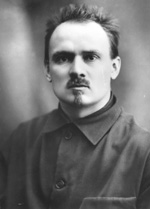Georgi Ippolitowitsch Oppokow
Georgi Ippolitowitsch Oppokow ( Russian Георгий Ипполитович Оппоков * 24 . Jul / 5. February 1888 greg. In Saratov in the Volga Federal District , † thirtieth December 1938 in Moscow ) was a Soviet politician and the first People's Commissar of Justice after the October Revolution .
biography
Oppokow was the son of a noble family in Saratov. He studied from 1906 to 1910 at the University of Saint Petersburg . In 1913 he passed the state examination.
- Party and revolution
In 1903 he joined the Russian Social Democratic Labor Party and was a member of the committee for the Moscow regional party organization from 1907 to 1908 . From 1909 he was an activist with the Bolsheviks and secretary of the committee for St. Petersburg . He worked for New Life in St. Petersburg, Wave in Saratov and Struggle in Moscow, and School and Life in Saratov. Arrested in 1910, he was interned in Arkhangelsk under strict police surveillance until 1913 . From 1916 to early 1917 he was again in custody in a camp in the Irkutsk province .
In 1917 he took an active part in the leadership of the February 1917 Revolution and the October Revolution of the Smolny Institute and was to become a member of the Constituent Assembly .
- Executive responsibility
From October 1917 he was the first People's Commissar for Justice in the Council of People's Commissars in the government under Lenin . From 1918 to 1921 and from 1929 to 1931 he was a member and deputy chairman of the Supreme Economic Council . From 1921 to 1923 he was responsible for the fuel supply. From 1918 to 1925 he was a candidate and from 1934 he was a member of the Central Committee of the CPSU .
1931 to 1933 he was at the committee for economic planning, the Gosplan deputy chairman. From 1933 to 1937 he was a member of the Presidium of the Soviet Control Commission.
- Stalin victims
In June 1937 he was arrested as part of the Stalinist purges , convicted and shot in December 1938. He was posthumously rehabilitated in 1956. His wife was arrested and banished. She died shortly after her rehabilitation in 1958 as a result of severe torture.
Individual evidence
Web links
- Article Georgi Ippolitowitsch Lomow-Oppokow in the Great Soviet Encyclopedia (BSE) , 3rd edition 1969–1978 (Russian) ( English )
| personal data | |
|---|---|
| SURNAME | Oppokow, Georgi Ippolitowitsch |
| ALTERNATIVE NAMES | Оппоков, Георгий Ипполитович (Russian); Lomow, A. (pseudonym) |
| BRIEF DESCRIPTION | Russian politician |
| DATE OF BIRTH | February 5, 1888 |
| PLACE OF BIRTH | Saratov |
| DATE OF DEATH | December 30, 1938 |
| Place of death | Moscow |
